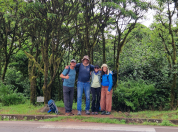Droevendaalsesteeg 10
6708 PB Wageningen
The Netherlands
My research at NIOO leverages computational and molecular biology to discover the hidden microbiome of Galápagos Giant daisies and its role as a catalyst for biodiversity and evolution.
Luzia Stalder is a postdoctoral fellow at NIOO-KNAW, supported by a Swiss SNSF PostDoc Mobility fellowship. Her research bridges microbiome and multi-omics data analysis with molecular genetics and plant-microbe interactions, focusing on how host evolution and microbiome composition influence each other. Luzia’s scientific journey began with a fascination for microbial adaptation, which led her to investigate the genetic signatures of fungal pathogen populations during her MSc at ETH Zurich. During her PhD at the University of Neuchâtel, she developed innovative methods for high-resolution profiling of microbial communities, including pangenome-informed amplicon sequencing and high-throughput workflows for large-scale sample analysis.
At NIOO-KNAW, Luzia integrates multi-omics data to analyze bacteria, fungi, and viruses, leading both high-throughput molecular analyses and field sampling efforts to unravel ecological interactions. Her current project investigates how microbiome evolution parallels plant speciation, using Darwin’s giant daisies on the Galápagos Islands as a model system. This research aims to pioneer a new field at the intersection of plant speciation and microbiome evolution, positioning her at the forefront of plant holobiont research.
Luzia is committed to interdisciplinary collaboration and mentoring, with a long-term vision to explore the evolutionary dynamics of host-microbiome interactions across biological kingdoms.
